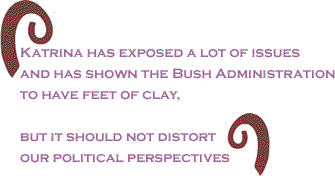
|
|||||||||||||||||||||
|
I am a native of New Orleans. Like so many in that city, I grew up in poverty with my family shuttling between several of the downtown housing projects (St. Bernard, Lafitte, Desire and Iberville). In 1965 when Hurricane Betsy hit New Orleans we were living in the Ninth Ward which, almost singularly, experienced flooding in the 4 to 8 foot range - a situation that was devastating but a lot less severe than the floods of Katrina where 80 percent of the city was affected and where water rose to as high as 20 feet. In the aftermath of Betsy we went for days without electricity and we “liberated” sustenance from the neighborhood grocery stores – all, for the most part, unrecorded by the television cameras. People suffered staggering losses – their lives, their homes, their possessions, their jobs. There was no evacuation to speak of and there was no recovery plan even remotely comparable to what is being contemplated now. For the most part people licked their wounds and went back to eking out a living as they had done before. New Orleans dried out and carried on. In subsequent decades, political empowerment, its concomitant cronyism, a limited corporate presence and the several higher education establishments provided a middle class option for a few. Other incumbent and would be members of the black middle class, myself included, escaped New Orleans, recognizing that opportunities for African Americans were largely confined to low wage, low benefit, low security jobs in the hospitality, leisure and gaming industries. Employment in the tourism sector provided a living at or slightly above the poverty line. A vast segment of the African America population – the unemployed, the underemployed, the disposed – suffered grinding poverty that spawned, variously, hopelessness, resignation and criminality.
New Orleans is now in its third generation of black political power but no serious student of New Orleans pretends that political empowerment is coterminous with economic power. The white economic elite, accompanied by an undercurrent of pervasive and, in some cases, mob inspired corruption, continued and continues to control the city’s economic fortunes. Those who were in poverty continued to fester in poverty. Indeed their numbers grew. The impoverished became an increasing percentage of the city’s population as whites and middle class African Americans abandoned the inner city with its failing schools, escalating crime and diminished opportunity. It was the city’s poor, for the most part, who were the people we saw at the Superdome, Convention Center, on and under the bridges and overpasses, devastated and abandoned. And now that the rescue and recovery effort is ending, they again face the prospect of being left out as the redevelopment process unfolds. In the days since Katrina the Congressional Black Caucus, traditional civil rights leaders, local black political elites, professional political scientists, pundits and Joe citizen have been asking, even demanding, that African Americans be included in the recovery process. They want to be at the table when decisions are taken and they have been insisting that the resulting programs address the fundamental interests of, not just the middle class, but of working class and dispossessed African Americans in New Orleans and the Gulf Coast region. My question is, in the prevailing political climate, how do we get to the table? Has Katrina brought about that sort of change? What has happened in national politics that would lead us to conclude that we have the means to affect this process any more meaningfully than we have affected public policy in the past two decades? My questions point to my concerns. Katrina has exposed a lot of issues (poverty, underdevelopment in the Gulf Coast region, the extent that certain agencies have been gutted and financially starved) and it has shown the Bush Administration to have feet of clay, but it should not distort our political perspectives. Once we get beyond the emotional reaction to Katrina’s devastation, our assessment of what is possible must take into account where the nation is politically. To assume that this most unfortunate event has fundamentally altered the prevailing political dynamic in the United States is wishful thinking. No one left office as a consequence of Katrina. The fundamental philosophy directing national policy has not changed. There has been no shift in the national political power equation. The zebra has not changed its stripes. The neo-conservative era is far from over.
Hard line conservatives control all the levers of government: the Administration, Congress, the Courts, and – as they penetrate to its middle ranks – the Bureaucracy. Their grip on state houses and politics is tightening not decreasing. Is it reasonable to expect that George Bush, Dick Chaney, Carl Rove, Tom DeLay, Bill Frist, Dennis Hastert, Rick Santorum, Joe Lieberman – the legions of conservative lobbyists, pressure groups and power brokers – and their cronies in the Administration and Congress, in governor’s offices and state assemblies, Republican and Democrat alike, have abandoned or redirected the steaming neo-conservative agenda because of Katrina? I think not. These people and their citizen supporters see the Bush Administration as nothing less than the culmination of a process that started with Richard Nixon, benefited from the friendly policy support of Jimmy Carter, was accelerated by Ronald Reagan, and coddled by Clinton era policies. The hard line conservatives successfully implemented a forced march to power that spans three decades. Bush may fall out of public favor and his administration will end, but that will not change the character of Congress or the Court System, with its lifetime appointees, and it will not change the minds of the people who helped consolidate the conservative juggernaut. We practice self delusion by not understanding this.
I am not convinced when Washington Post columnist E.J. Dionne argues that the Bush Era has ended (Washington Post “End of the Bush Era,” September 13, 2005). If we equate the Bush Era with high numbers in public opinion polls then his administration may well limp to the finish line. His image and legacy may suffer. Poll numbers are one thing, but we have yet to see the failure of his legislative agenda. Beyond that, it is important to understand that the Bush Era and the era of hard line conservatism are not one and the same. More interests are invested in the conservative agenda than just Bush and the immediate representatives of his Administration. For the hard line conservatives this is no time to waver. They fully intend to rule for generations and plan to leave an indelible stamp on American politics and society. Even if Bush were inclined to pursue a fair, honest and transparent recovery, which I know will not be the case, we should not expect that he could impose his wishes on Congress – many of whom are further to the right than his administration – or even on his hard line cronies in the Executive Office. Dionne’s call for leaders of both parties to declare their independence of the Bush Administration may sound forward looking. But what he fails to acknowledge is that many of those would be independent Republicans (and Democrats) have a much more conservative policy agenda than Bush. We need look no further than the rapid resort to no bid contracts going to well placed corporations like Fluor, Bechtel, Kellogg, Brown and Root (Halliburton) – in other words, the usual suspects who are the prime private sector beneficiaries of the war in Iraq. Bush moved quickly to waive prevailing wage requirements for contractors working on hurricane relief projects. That was reassuring to the conservatives in Congress who had been fighting to strike that provision altogether. They now have a beachhead. Beyond that, it is not likely that many in the displaced population will benefit from construction and other jobs due to limited skills and low labor force participation rates before Katrina. Even with the lower wages others likely will get those jobs. The Education Secretary’s crisis related spending proposal is being met with mixed emotions because astute observers see it as a carefully crafted effort to introduce through the back door, and in spite of public wariness, a national voucher system by providing tuition support for students who attend private schools in the Gulf region. Hard line conservatives have asked to put off implementing the prescription drug benefit for one year. Many of them opposed the plan from its inception and would like to proceed from delayed implementation to derail the plan altogether. Conservative Republicans are already preparing to make sure that the next emergency spending request does not fly through Congress like the earlier $62 billion request. Some members such as Arizona Representative Jeff Flake (R) have characterized anticipated Katrina relief spending as an irresponsible new entitlement program. His high sounding pronouncements aside, Bush has made a determined effort to assure conservatives that he has not abandoned his commitment to “limited government” and “fiscal prudence.” His call for the national equivalent of a Gulf Coast “Marshall Plan” is accompanied by an equally forceful declaration that it will be pursued without increasing taxes and will be accompanied by offsets from existing spending programs. In the effort to identify budget offsets for the new Marshall Plan, Bush has asked Congress to revisit his budget submission from earlier this year. That budget contained deep cuts in social programs. Do we need to guess who would have borne the brunt of those cuts? Congress, concerned more about Pork Barrel spending than the well being of the citizenry, failed to cut the budget as deeply as Bush proposed but still managed to include $35 billion in spending cuts in programs for low- and moderate-income families, and $70 billion in new tax breaks, mostly for the rich. Now, in the face of Bush’s Katrina recovery commitment, the programs that survived are likely to be revisited. It would be a travesty if, after the initial tragedy, we are confronted with an even more draconian consequence where Congress robs the poor to give to the rich while making symbolic overtures to the Katrina’s real victims. In the face of these likely developments what leverage do African Americans have? Should we expect that Katrina has given us an opening to appeal to the compassion of Bush and Company? To think so is laughable. For that crowd compassion is little more than a symbol laden political slogan. It reflects no related programmatic commitments. Their compassion takes the form of cutting taxes for the rich, eliminating the Estate Tax, limiting the public’s ability to sue corporations, killing the bankruptcy option for the average Joe and loading the Energy and Transportation bills with more pork than Hormel and the Jimmy Dean sausage factory can handle together. Can we expect continued media scrutiny such as we saw during the height of the Katrina Crisis? Maybe some, but not much that will be of consequence. The corporate media, which has been emboldened to some extent during this crisis, is still subservient to and intimidated by the hard line conservatives. The momentary flash of courage that we witnessed over the past several weeks does not mean that the cowardly lion has now found a heart. What about access? This administration has treated the CBC and the traditional civil rights leadership like red headed step children. They have no access to speak of. It is true that Bush reached out to many African Americans in the immediate aftermath of the hurricane and in the face of a spreading public relations disaster. But we should not confuse his PR overtures for a genuine effort to be inclusive. When the Bush Administration does reach out it is likely to be to their hand picked, and carefully cultivated alternative African American leadership stratum – their Republican Party operatives, think tank researchers, media spokespersons and pundits, and mega church executives wrapped in their faith based, gospel of prosperity. Even then, much of that effort is likely to take the form of PR since the real horse trading is taking place in Congress and within the Executive Office. We should not blind ourselves with delusions about the amount of leverage we have as a result of this tragedy. No one of consequence who really wants to advance the interests of African Americans is likely to be invited to Bush’s Gulf Coast recovery and reconstruction table.
Paul Krugman (NYT 9/5/05 “Killed By Contempt”) was prescient in identifying the issue in play as the hard line conservative premise that government is the problem and that it has no definite and non-negotiable responsibilities to the citizenry. The hard line conservatives have been moving full speed ahead in their program to “starve the beast” through tax cuts and giveaways for corporate America and the wealthy, by knifing social programs and shredding the social safety net, through deregulation and privatization, and by shifting federal spending in the direction of corporate entitlements, pork barrel earmarks and crass, unapologetic crony capitalism. For them government has a responsibility to promote and support the private sector in myriad ways, but essentially the citizenry is on its own in much the same way that the victims of Katrina were on their own in those early days after the flood. Krugman was premature in his expectation that the Katrina Crisis would produce an epiphany that would lead the public to reject hard line conservative notions about government: that big government is bad government and the best government; that the best government is less government, and their program to make those self-fulfilling prophecies. The polity has not reached that point. Instead of hoping for Bush to be born again to the notion of government of, by and for the people, we should begin serious discussion of the daunting political project that awaits people of all classes and ethnic groups who want to tackle head on the problems, including poverty, that confront this country. That task is to reassert the idea that government should serve the people and defeat the conservative philosophy that even many Democrats – some of them African Americans – have embraced. An alternative consensus has to become politically predominant which says that the government has a responsibility to build and maintain the physical infrastructure (transportation, sewer and water, energy security and conservation, flood control; environmental protection); and that every American citizen has a right to a decent education and job training, quality health care, income security and impartial justice. It is not enough to just focus on the presidency. The new project for the 21st Century is no less than the need to change, wholesale, congressional district by congressional district, political jurisdiction by jurisdiction, the ruling political class in the country and the ideology that informs policy making. If Katrina is to produce anything of consequence it should be to set this process in motion. We need a new way of thinking about and national consensus on the responsibilities of government. Let us go to the table to thrash out the answers to that question. Earl Picard is a Political Scientist who lives in Atlanta, Georgia. He can be reached at [email protected]. © September 2005 |
Your comments are always welcome. Visit the Contact Us page to send e-Mail or Feedback or Click here to send e-Mail to [email protected] e-Mail re-print notice
If you send us an e-Mail message we may publish all or part of it, unless you tell us it is not for publication. You may also request that we withhold your name. Thank you very much for your readership. |
| October 6 2005 Issue 152 |
|||||||||
|
|||||||||
|
|
|||||||||
| Printer Friendly Version in PDF format. Download free Adobe Reader. | |||||||||
 |
|||||||||
 |
|||||||||
| |
|||||||||
| |
|||||||||





























